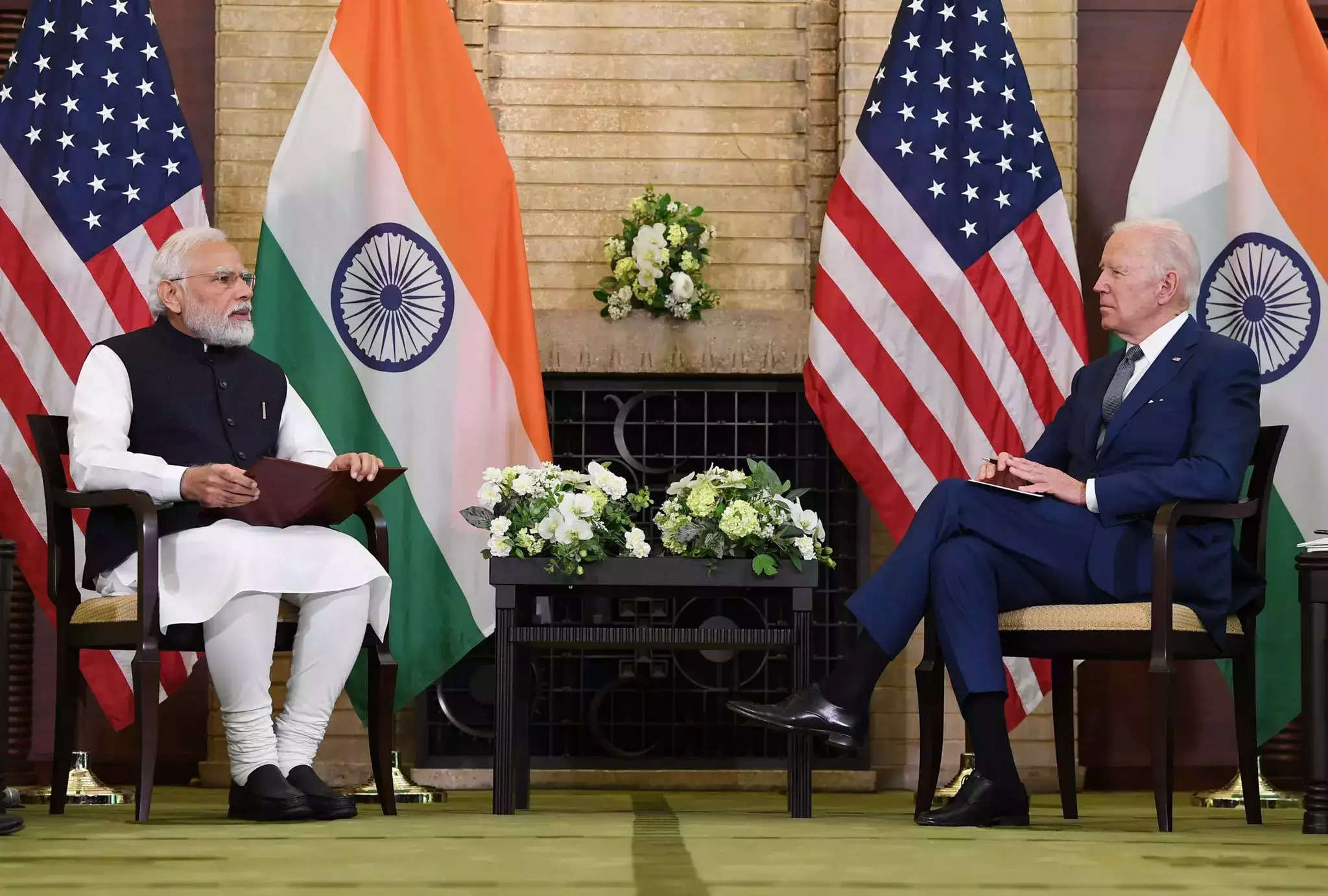Should India Look Beyond Initiatives Led By The US: Be It NATO, QUAD Or G-7?
India's ability to shape the global vision for the coming century will remain limited without India being in a permanent position to do so unless insists on a more pro-active role in the QUAD and the G7 ( that should be a G8) grouping, or else be limited to the rotatory roll that India has had as a member of the UN security council.

Updated May 29, 2023 | 03:35 PM IST

Should India Look Beyond Initiatives Led By The US
New Delhi: Although India has been historically opposed to alliances - from the time that Pandit Nehru rejected President Truman’s offer to join the anti-Communist alliance to the reluctance of PM Atal Vajpayee to enter into an alliance with the US, at the time of President Bush- it now seems to be drifting into a set of quasi alliances to handle the many geopolitical challenges, India faces. The most recent proposal doing the rounds in the US Capitol, is to add India into a NATO plus group with five other aligned nations like, Australia, New Zealand, Israel, Japan, and South Korea, to add to the ranks of the 31 member NATO, to counter Russia’s ambitions in Europe and China’s goals in Asia. It would bring India into a closer relationship with the West, and its sword arm, the now re- energized NATO members who are all aligned together in a singular purpose of containing China's and Russia's ambitions. Will India do so? Recent events have shown that India is riding a geopolitical high having first become the rotary UNSC membee then head of the G20 block of countries allowing it to lead the global South group. And then as an invitee to the G7 meeting at Hiroshima in Japan where it made the only worthwhile 'proposals' to a conference that couldn’t look beyond Russia’s invasion of Ukraine and China’s aggressive geo-political agenda. A sudden change in arrangements also led to Japan ( the host of the G7 countries to host the QUAD meet at the same venue). That India is a key partner of the four nation QUAD, has helped them as India is being seen as the ‘go to country’ to counter China. For India, China is without doubt a primary threat both territorial and strategically, but Russia still remains a good friend of New Delhi and a major arms supplier, no matter how hard the US and the Europeans try to replace India's reliance on Russian military products, and this is the dilemma for the G7 and NATO.
The war in Ukriane has cast doubts over how long can Russia remain the primary source for India’s military platforms – as the IAF has expressed publicly it's concerns on this score – as India needs more aircrafts to meet the demands of its armed forces, even as Chinese forces are militarizing their deployments along the Himalayas. Moreover, moving away from the Russians completely towards the US, doesn’t seem like a good idea as India has enhanced its oil imports from Russia – from 2 to 24% - in the past one year. And, we would do well to remember that in the post 9/11days, the US rewarded Pakistan with a ‘major non- NATO military ally’ status in 2004, though the US perhaps was to regret it later. The fact that Pakistan misled Washington repeatedly in America's war on terror in Afghanistan, and fleeced America for funds in excess of $30 billion dollars is a harsh truth the sympathizers of Pakistan In Washington are unable to counter, on how the US mis-read so badly, even though the US has had deep ties with Pakistan’s establishment for decades. And even now the US is unwilling to punish Pakistan, for its terror agenda, in the hope of countering China and Russia. America has more think thanks than the British army has tanks, but even then it gets a host of strategic calculations wrong, as we have seen in Iraq and Syria, as also against Iran.
Equally any realist would note that even though the QUAD arrangements that India has been a part off with the US, Japan and Australia, the QUAD has been a talking shop for years without it defining how they intend to take on the Chinese, beyond ensuring free movement of ships in international waters (or global commons). India is the only QUAD member that has a boundary dispute with China that could easily escalate into a boundary war. Thus, it is somewhat baffling considering that it was the Chinese challenge that had brought them together! The QUADs desire to collectively produce answers to the next pandemic that could come in the form of another menace, and to find options for bi-lateral technological advances, has given Beijing reasons to smile knowing that the QUAD without any specific military -maritime purpose would be a another talking shop like the G7, which started as a body to find solutions to the world's economic challenges but it's today hopelessly looking at containing Russia. Would a Chinese invasion of Taiwan or across the Himalayas - like Russias did in Ukraine – give the QUAD a good reason to abandon their delusions – like the NATO suddenly found a new purpose after February 2022? What thus needs to be done – and India must insist on it – is to give QUAD a Maritime cum Military purpose. Interestingly India is the only QUAD member that can immediately stifle China's naval ambitions in the Indian Ocean, by giving effectiveness to the Chinese nightmare of a ‘Malacca dilemma’; that'll put pressure on China in the waters around South East Asia, by blocking its sea supply routes of oil and trade, and using it to get the Chinese to back off along the Himalayas. Eventually, India will need the QUAD partners to join in, sooner than later.
Likewise, the G7 needs to do a serious amount of thinking if it is to become anything more than a meeting of the leaders of the richest countries as it was in Hiroshima lately. A major step that the G7 could have taken apart from denouncing Russia's invasion of Ukraine was to invite India to become a member of the G7 - a group of the world's richest economies, that apparently account for 45% of the world's wealth - by inviting India to join the group, as it once did with Russia in the 1990s, to make the G7 into a G8, would've been useful since India is now amongst the five largest economies in the world and is expected to move up to 3rd place in the next 5 to 6 years. Moreso, India is the de-facto leader of the G20 and a bridge to the ‘Global South’ for the G20 countries to engage with the G7 which today is as ineffective as the 5 member UN security council that has been able to do very little against the Russian invasion of Ukraine.
Therefore, while such summits provide India's leaders the necessary photo opportunities to be seen hugging and hobnobbing with the top leaders of the Western world, India's ability to shape the global vision for the coming century will remain limited without India being in a permanent position to do so. India must unle insist on a more pro-active role in the QUAD and the G7 ( that should becomd a G8) grouping, or else be limited to the rotatory role that India has had as a member of the UN security council. India now has the economic and demographic weight to show how the world can address the challenges that go beyond trying to limit Russian or Chinese ambitions.
(Maroof Raza is a guest contributor. Views expressed are personal.)
End of Article
Videos





02:08
What Are Key Differentiating Points In Poonawalla Fin Corp ? | Explains MD Abhay Bhutada

03:23
Breaking News | BJP MP Accuses Leaders Of 'Adjustment' With Congress In Karnataka, Sparks Infighting

03:38
Manipur Violence Erupts Again As Kukis, Meiteis Refuse Peace Talks| 9 Killed In Flare-Up

03:03
How MD of Poonawalla Fincorp Abhay Bhutada Started His Career ? | Business News

03:56
TMC Workers Clash In West Bengal Ahead Of Upcoming Panchayat Polls | Election News













